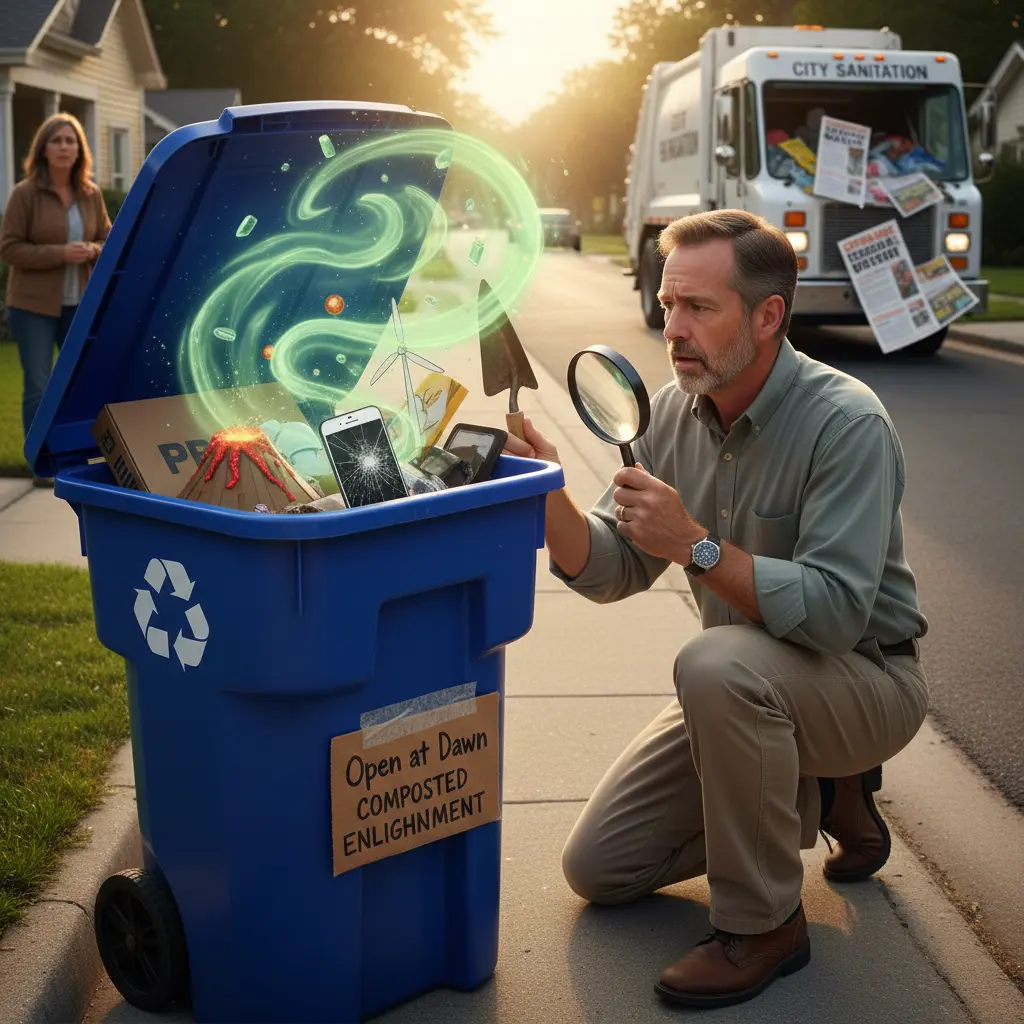HARRISBURG, Pa. — After a decade of dutifully depositing pizza boxes, cracked phones and a childhood science-fair volcano into his curbside recycling bin, local man Jeremy Novak said Monday he was “profoundly unsettled” to learn the container does not, in fact, function as a magical portal to global sustainability.
“I thought I was doing my part,” Novak, 34, told reporters as he sifted through the bin with a garden trowel and a magnifying glass, looking for signs of interdimensional transit. “Every time the truck came I pictured my trash going to, like, a renewable-energy crucible where it’s smelted into wind turbines or returned to the Earth as clean air. There were arrows in a circle. What else could that mean?”
The revelation came after a routine neighborhood cleanup turned into an existential confrontation with municipal reality. When Novak asked the city Department of Sanitation whether his recycling was being instantaneously converted into climate neutrality, an agency spokeswoman, Denise Alpert, issued a statement explaining the program’s limits.
“Curbside recycling is collected, sorted and processed according to standard recovery protocols,” Alpert said. “It is not a portal, gateway or spell that instantly transforms municipal solid waste into a zero-emission utopia. The arrows indicate ‘recyclable stream,’ not ‘recyclable wormhole.’”
Despite the clarification, Novak said he found the city’s explanation unsatisfying and “bafflingly bureaucratic.” He pointed to the bin’s green lid, the ubiquitous chasing-arrows logo and marketing materials from private companies promising circular-economy outcomes as proof that modern recycling is, at minimum, an aspirational teleportation system.
“They had a flyer once that said ‘Reimagine Waste,’” Novak said. “Reimagine is basically a verb for ‘turn into something better instantly.’ My expectations were reasonable.”
Environmental experts say Novak’s misunderstanding, while unusual in its literalism, reflects broader public confusion about recycling efficacy. A study released last month by the Institute for Applied Consumer Misconceptions found that 18 percent of respondents believed curbside recycling involved immediate material transformation, and 62 percent expected some form of “instant karma” credit to their household carbon ledger.
“People conflate symbolic visuals with functional guarantees,” said Dr. Mariah Lenz, the study’s lead author. “A nicely designed stoop-side receptacle paired with optimistic language and circular iconography is fertile ground for magical thinking. That said, the bin does not, and has never, had a way to return used GoPros as solar panels.”
Complicating Novak’s faith was a spate of premium services marketed to eco-conscious consumers. GreenLoop Solutions, a private firm that offers “full-cycle assurance” for a fee, ran a 2019 promotion described in internal memos as “reassuringly mystical.” The company’s current spokesman framed the service as “logistically advanced” rather than supernatural.
“For $29.99 a month, we guarantee your materials will enter a verified post-consumer repurposing pathway,” said Nolan Piper, who added that the company does not, and cannot, engage in instantaneous transmutation. “We also offer optional mindfulness sessions to reconcile expectations.”
Neighbors, who say Novak’s attachment to the bin reached ritualistic proportions, recalled him leaving offerings in the form of labeled envelopes and articles of clothing. “He once taped a note to his lid that read, ‘Please send composted enlightenment,’” said neighbor April Chen. “We thought it was a joke.”
City statistics indicate Novak’s personal diversion rate was not extraordinary: last year his household placed 103 pounds of material at the curb, 42 percent of which was contaminated with food residue, broken electronics or polystyrene—items that often end up in landfills despite good intentions.
Novak, who said he still has “hope for a future in which refuse becomes renaissance,” is taking steps to adjust his approach. He plans to attend a municipal recycling workshop and has ordered a subscription to a neighborhood tool-sharing program. He did not, however, immediately surrender his ritual: he told reporters he placed a small cardboard sign on the bin that reads, “Open at dawn.”
When asked whether he finally accepted the bin’s mortally ordinary function, Novak paused and then said, “I suppose I’ll stop expecting miracles from my curb. For now I’ll just expect them from my compost tumbler.”

